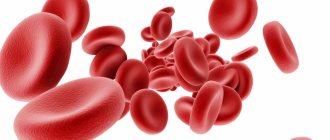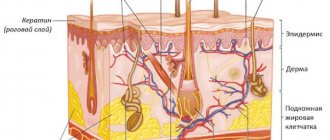Dizziness is the second most common problem with which people turn to neurologists. It occurs only slightly less frequently than headaches. Moreover, the frequency of its occurrence increases proportionally with age, and women suffer from such attacks 2-3 times more often than men. But dizziness refers to quite different symptoms, from the sensation of rotation of surrounding objects or one’s body to darkening of the eyes, unsteadiness of gait, etc. And there are even more reasons for the occurrence of such disorders. One of the most commonplace is an increase or decrease in blood pressure. But if the tonometer readings are within the normal range (120/70) or close to it, you should look for the cause of dizziness elsewhere.
How to determine the cause of dizziness at normal blood pressure
Most often, finding out the cause of a patient’s health problems begins with collecting anamnesis and measuring blood pressure, since in most cases this allows you to immediately eliminate a whole range of disorders. The cause of dizziness without changes in blood pressure can be a rise to altitude, a long trip in a car or boat, or physical fatigue. In such situations, there is usually no threat to health and no need to see a doctor.
In other cases, it is necessary to differentiate systemic dizziness from non-systemic dizziness. In the first case, there is damage to the vestibular analyzer, i.e., the organ responsible for maintaining balance and adequate reactions of the body to changes in the position of the body or head. Non-systemic dizziness is caused by other diseases that are in no way related to the work of the vestibular analyzer.
With normal blood pressure levels and the absence of heart and vascular diseases, systemic (vestibular or true) dizziness is most often diagnosed. According to statistics, about 30% of people encounter it at least once in their lives.
A very important point in determining the cause of a disturbance in well-being is an accurate description of the sensations that arise during an attack. At the same time, it is important to try to avoid the word “dizziness” and talk in as much detail as possible about the feelings that arise.
Systemic vertigo is characterized by the presence of various illusions of movement. This may be a feeling:
- rotation of the body in space or vice versa of environmental objects;
- rocking the bed on which the patient is lying, rocking in a boat, falling into space;
- the ground leaving under your feet, the ceiling collapsing, etc.
With systemic dizziness, which occurs with normal blood pressure, there is no sensation of darkening in the eyes, flickering of spots, fog in the head, lightheadedness, or unsteadiness. Such symptoms indicate the non-systemic nature of the disorder and the need to search for causes in pathologies of other organs, not excluding the heart and blood vessels. After all, during an examination, blood pressure may be normal, but sharply fall or rise in response to a specific trigger.
The main distinguishing feature of systemic vertigo is nystagmus - rapid, involuntary movements of the eyeballs.
Causes of systemic dizziness
Systemic or vestibular vertigo may be central or peripheral. In the first case, the reason lies in damage to the corresponding nuclei of the brain stem and its vestibular centers, disruption of vestibular connections, which is typical for:
- circulatory disorders in the vertebrobasilar system, accompanying a transient ischemic attack or stroke, which is often observed in diseases of the spine and cervical osteochondrosis in particular;
- vestibular migraine;
- multiple sclerosis.
When the central part of the vestibular analyzer is damaged, the severity of symptoms increases smoothly. They are not very pronounced, but can persist for several days or even weeks. In such cases, headaches, visual disturbances, inability to walk and falls are also often observed.
Central vestibular vertigo accounts for 12% of all cases of patients visiting doctors with similar complaints.
In case of peripheral vestibular vertigo, the problem should be sought in damage to the vestibular analyzer or nerve. In such situations, it may consist in the development of:
- benign paroxysmal positional vertigo (BPPV);
- Meniere's disease;
- vestibular neuritis;
- bilateral vestibulopathy;
- neurovascular conflict, etc.
There is a whole range of other peripheral causes of dysfunction of the vestibular analyzer, but they are much less common - less than 0.5% of cases. But almost always, when the vestibular analyzer or nerve is damaged, the attack begins acutely and lasts no more than a day. It is characterized by a sudden onset of a pronounced sensation of rotation. This may be accompanied by nausea and even vomiting, tinnitus and hearing loss.
Causes of non-systemic dizziness
Dizziness while maintaining normal blood pressure levels can be provoked by:
- inflammatory processes of the ear;
- following a strict low-carbohydrate diet;
- Iron-deficiency anemia;
- taking certain medications;
- endocrine disorders, including diabetes mellitus;
- infectious diseases accompanied by a significant increase in body temperature.
But in such situations, patients are usually aware of their problem and the possibility of dizziness. The only exception, perhaps, is iron deficiency anemia, which provokes increased fatigue. But to diagnose it, it is enough to take a general blood test.
When dizziness occurs against the background of normal blood pressure, its psychogenic origin cannot be excluded. This is observed in 15% of cases and therefore deserves special attention.
First aid at home
There are several ways to relieve a short-term attack:
- ventilate the room;
- lie down on a flat surface, and it is recommended not to make sudden movements of the head;
- if possible, place a cool compress on your forehead;
- when in a public place, try to find a secluded corner to sit down, take a couple of sips of plain water, close your eyes and lightly press on your eyelids;
- after the attack has subsided, spend 5–10 minutes in a resting position; when getting up, do not make sudden movements, so as not to provoke a new wave of vertigo.
When urgent medical attention is needed
When vertigo appears along with symptoms such as:
- darkening of the eyes;
- stuffiness and pain in the ears;
- nausea;
- headaches;
- fainting;
- nosebleeds;
If you have had isolated attacks, or the unpleasant condition occurs systematically, then the only correct decision is to immediately consult a doctor. The doctor will conduct a diagnosis and identify the cause of the ailment, only then can we talk about prescribing the correct treatment.
BPPV
BPPV is diagnosed in 17% of patients complaining of dizziness and is the most common cause of its occurrence. Moreover, the frequency of its occurrence increases in proportion to age, and in women it occurs 2 times more often. This is a disease in which otoliths move into the semicircular canals of the inner ear.
Otoliths are calcium carbonate crystals normally located in the otolithic membrane of the inner ear.
With BPPV, attacks are usually triggered by head movements, especially at night, when the patient cannot control himself. There are frequent situations when dizziness occurs after turning in a dream or getting up/getting out of bed. In this case, dizziness begins acutely, but lasts less than a minute, although it may be accompanied by nausea and vomiting, nystagmus. It is not associated with hearing loss, noise, or ringing in the ears.
The duration of the attack usually does not exceed several minutes.
In most cases, the causes of BPPV cannot be determined. Only in certain situations is its development associated with head injuries, ear surgeries, or previous diseases of the inner ear.
But on the other hand, BPPV does not require specific treatment and, as a rule, goes away on its own in a few weeks or months. Patients are only taught special maneuvers to facilitate the release of particles from the affected semicircular canal to eliminate dizziness. But before they are carried out, it is imperative to consult a doctor who will confirm or deny the presence of BPPV and determine its type. Otherwise, as well as if the technique is violated, your condition may worsen.
There are more than 5 different maneuvers to relieve an attack of dizziness due to BPPV. The choice of which one will be most effective for an individual patient depends on which part of the labyrinthitis his otoliths move to. In most cases, the Eple maneuver is recommended. Its essence is as follows:
- turn the head 45° towards the affected ear and lie on your back (this may be accompanied by increased dizziness);
- the head is turned sharply towards the healthy ear so that it is at an angle of 45°;
- continue turning to the healthy side with the whole body so that at the end point the face is directed downward;
- rise to a sitting position, maintaining a head tilt of 45°.
You should remain in each position for about 1 minute, and change them as abruptly as possible.
In half of the cases, correct implementation of therapeutic maneuvers allows for long-term elimination of BPPV symptoms. Although 25-50% of patients experience relapses. In such situations, repeated maneuvers are indicated.
Disease Prevention
It is not always necessary to carry out special drug treatment; sometimes it is enough to simply adjust your lifestyle. Prevention measures:
- watch your diet - food should be healthy, varied and balanced;
- try to give up bad habits;
- if your work involves a computer, take short breaks every hour to give your eyes a rest;
- walk outdoors more often;
- observe the rest and work schedule;
- after a hard day at work, take a cool shower to restore energy and relieve fatigue;
- Dedicate 10 to 15 minutes of free time every day to perform the exercise.
I note that not only antibiotics from the aminoglycoside group have a high ototoxic effect, but also cytostatics (Methotrexate) and anti-tuberculosis drugs. Aspirin is slightly less toxic to the organ of hearing and balance. Next to reduce possible harmful effects are loop diuretics (Lasix, ethacrynic acid), macrolides (Azithromycin, Clarithromycin) and fluoroquinolones (Ciprofloxacin), as well as painkillers (Indomethacin, Naproxen and Lidocaine). Taking the above medications may cause attacks of dizziness. If alarming symptoms appear, you should immediately consult a doctor.
Victoria Druzhikina
Neurologist, Therapist
Meniere's disease
According to statistics, Meniere's disease is diagnosed in 10% of patients who complain of dizziness. This is a disease of the inner ear, in which there is an increase in the volume of labyrinthine fluid and an increase in pressure within the labyrinthitis. Most often it occurs after 30 years.
Meniere's disease is characterized by episodes of systemic dizziness, which is associated with a progressive decrease in hearing acuity, tinnitus, and unsteady gait. Often there is also a feeling of stuffiness in the ear. In this case, hearing impairment manifests itself to a greater extent directly during an attack of dizziness, which can last from several minutes to a couple of hours. This is associated with nausea and vomiting.
A characteristic feature of Meniere's disease is the possibility of a so-called aura immediately before an attack. It may manifest itself:
- increasing noise in the affected ear;
- ear congestion;
- hearing impairment.
But the aura is not observed in all cases. Therefore, in its absence, the possibility of dizziness at normal pressure due to Meniere’s disease cannot be excluded.
When the pathology manifests itself, attacks occur frequently and initially their frequency increases. Over time, the trend reverses and dizziness bothers patients less and less.
During the disease there are 3 stages:
- Stage 1 – tinnitus is observed only periodically and is accompanied by a feeling of fullness and congestion, which leads to a decrease in hearing acuity. But at this stage, hearing between attacks is restored.
- Stage 2 – noise and congestion in the ears are constantly present, attacks become more frequent and occur almost daily. In this case, the dizziness is very intense, and hearing between attacks is practically not restored and can completely disappear.
- Stage 3 – the interval between attacks gradually increases, although hearing loss persists and is irreversible. There is also a constant feeling of unsteadiness and instability.
Initially, with Meniere's disease, only one ear is affected, but in 50% of patients, within several years, the second ear is also involved in the pathological process.
When diagnosing Meniere's disease, the main priority of treatment is to prevent the occurrence of attacks, since suddenly appearing intense dizziness significantly reduces the patient's quality of life, and in the early stages can deprive him of his ability to work due to the high frequency of episodes. For this purpose, patients are prescribed a salt-restricted diet, as well as individually selected drug therapy.
Definition and Features
It is necessary to distinguish between true dizziness, in which there is a feeling of objects moving in space. Such symptoms may be normal if they occur after prolonged rotation around its axis (on a carousel), but in other cases they indicate a malfunction of the vestibular apparatus. The difficulty in diagnosing this condition is that the doctor has to rely only on the patient’s testimony. Many people also mean other symptoms by this term: impaired visual acuity, headaches and others. In reality, dizziness should be understood as a feeling of movement of environmental objects in relation to a person, while the body position is felt as stable. Most often these are circular movements (objects rotate around a person’s axis), but they can also be linear (a feeling of falling or rising in height, various shocks).
Vestibular neuronitis
Vestibular neuronitis or neuritis means inflammation of the vestibular root of the 8th pair of cranial nerves, i.e., the vestibular-cochlear nerve. It has not yet been reliably determined what exactly provokes the development of this disease. According to research, it is assumed that herpes virus infection type 1 is involved in this. This theory is also supported by the fact that most often neuritis manifests itself after suffering from an acute respiratory infection.
The disease is characterized by a sudden onset of severe dizziness with a sensation of rotation of surrounding objects, which tends to gradually weaken over time. But head movements or changes in body position provoke a deterioration in health. The attack is accompanied by nausea, vomiting, and nystagmus. In this case, the oscillatory movements of the eyes are directed towards the healthy ear. There is also an imbalance, with falls more often occurring on the side of the healthy ear. But vestibular neuritis is not accompanied by hearing impairment or neurological disorders.
Dizziness may last for hours or days, and unsteadiness may persist for a week or longer.
When diagnosing vestibular neuronitis, symptomatic therapy is indicated to alleviate the patient’s well-being. It is designed to eliminate nausea, vomiting and reduce the severity of dizziness. Specific drugs are selected by a neurologist individually, taking into account the characteristics of the patient’s condition and the nature of concomitant diseases. As a rule, the course lasts no more than 3 days.
It is also recommended to perform special visual exercises, head movements, walking and balance exercises. They need to be performed daily, devoting at least half an hour to exercise.
In most cases, the measures taken are sufficient to eliminate the disease and normalize the patient’s condition. Within a few weeks, central vestibular compensation occurs, which leads to the elimination of the symptoms of neuritis. But instability and difficulty maintaining balance, especially when moving the head, can persist for a long time. But in 15% of patients, after the symptoms of vestibular neuronitis subside, the development of BPPV is observed, and psychogenic dizziness often occurs.
Principles of therapy
Since dizziness is not considered an independent disease, the choice of the correct treatment tactics is determined by the specific cause that caused the symptom. As a rule, a timely diagnosis allows dizziness to be completely eliminated or the condition to be prevented from worsening. The key to success in this case will be a timely and accurate diagnosis, taking into account the individual characteristics of the patient’s body, selecting the right treatment program with the prescription of effective medications.
Bilateral vestibulopathy
Bilateral vestibulopathy refers to bilateral deficits in vestibular function, which is clinically manifested by:
- attacks of dizziness while moving with the illusion of rotation of the environment;
- instability;
- imbalances, especially severe in the dark and when walking on uneven surfaces;
- decreased visual acuity while walking and making head movements.
But all the symptoms are observed only when the person is in an upright position. If he sits or lies, there are no such violations.
Most often, bilateral vestibulopathy occurs as a result of taking medications, especially aminoglycoside antibiotics, as well as after suffering from infectious and inflammatory diseases of the brain and some other pathologies.
It is impossible to completely eliminate the disorder, but by performing a special set of exercises selected separately for each patient, it is possible to achieve the development of central vestibular compensation.
Popular medications on the topic
Cerebrolysin Cerebrolysate
For more information about the causes of dizziness, watch the video:
Diagnosis and treatment of dizziness is a difficult task even for an experienced doctor. In every case of a painful, prolonged or sudden attack, consultation with a specialist is required. Only he will determine what the patient should do next, what consultations and examinations she needs.
This article has been verified by a current qualified physician, Victoria Druzhikina, and can be considered a reliable source of information for site users.
Bibliography
1. https://kiberis.ru/?p=50203 2. https://nikio.ru/docs/02-golovokruzhenie1.pdf 3. https://docs.cntd.ru/document/901918942
Assess how much it was useful article
4.4 147 people voted, average rating 4.4
Did you like the article? Save it to your wall so you don’t lose it!
Neurovascular conflict
In neurovascular conflict, episodes of dizziness are caused by compression of the 8th pair of cranial nerves by an abnormally located blood vessel. As a result, the myelin sheath of the nerve becomes thinner, which leads to its constant stimulation by the vessel and overexcitation of the vestibular nucleus.
This is accompanied by short attacks of dizziness, which usually occur with a certain position of the head. This is often associated with tinnitus and hearing loss. In this case, episodes of dizziness can bother the patient several times a year, or 2-3 times a day.
For frequent, severe attacks, patients are prescribed specific drug treatment. If in response to it there is a decrease in the number of attacks, a decrease in their severity and duration, this serves as additional confirmation of the presence of a neurovascular conflict. In such situations, MRI is highly recommended. If its results confirm the diagnosis, it is worth performing surgery to decompress the vestibular-cochlear nerve as early as possible before hyperactivity of the vestibular nucleus develops.
Treatment and prognosis
Specialists at the Clinical Brain Institute will select the most effective treatment regimen, depending on the diagnostic results. In most cases, dizziness does not pose a threat to the life and health of the patient and is easily corrected with general measures and medication. Thus, the following methods of treating the causes and clinical signs of this condition may be recommended:
- constant monitoring of blood pressure indicators, if necessary, taking antihypertensive drugs;
- preventing the appearance of edema - limiting salt intake, prescribing diuretics (diuretics);
- taking vestibulics - drugs to eliminate the symptoms of dizziness;
- if necessary - antihistamines, anti-epileptic drugs;
- restoration of movement coordination with special exercises.
Dizziness is not a disease, but one of the symptoms of a dysfunction of the vestibular apparatus. It is impossible to determine its cause at home, so if it occurs, it is worth undergoing a comprehensive diagnosis at the Clinical Brain Institute. It employs broad and specialized specialists who regularly examine and treat patients with similar symptoms. The medical center also has the opportunity to undergo complex examinations using high-quality equipment necessary to make a diagnosis. Despite the fact that dizziness alone is not a dangerous symptom and cannot threaten the patient’s life, it can indicate serious problems with the vestibular system and organic lesions of the central nervous system in the early stages. It is impossible to cure these pathologies on your own, but an integrated and competent approach in a hospital setting will eliminate both the causes and manifestations of dizziness.
Vestibular migraine
Migraine is a widespread disease, the manifestations of which are very diverse. Most often, in addition to dizziness at normal blood pressure, migraine is accompanied by a severe headache. As a rule, it is one-sided, pulsating and can persist for several minutes, hours, or several days. Often during an attack there is increased sensitivity to light and sounds.
Some patients notice the appearance of an aura before the onset of a migraine. In most cases, it consists of the occurrence of visual disturbances: loss of visual fields, flickering of spots in front of the eyes, luminous lines, etc. The aura usually appears an hour or less before the onset of the attack, and then disappears without a trace.
Migraines are more often diagnosed in women, and episodes of dizziness may be directly related to the phase of the menstrual cycle.
Treatment is carried out with medication. Usually, to eliminate pain and dizziness, the same medications are prescribed as for classic migraine. If attacks occur frequently, basic therapy is selected that is appropriate to the situation. All patients are also advised to avoid stress, eat right, normalize their work and rest schedule, and regulate the amount of physical activity.
Diagnostic methods
The Clinical Brain Institute has all the conditions for a full diagnosis of dizziness. The process is carried out by analyzing the work of the vestibular apparatus and the brain, after which the localization of the pathological process and its stage can be detected. During the initial examination, it is important to conduct a detailed interview with the patient and obtain a detailed description of the complaints. At this stage, it is possible to differentiate true dizziness from other conditions that are also often called by this term. Next, specialists will select an individual diagnostic scheme, which may include the following steps:
- examination of the spinal column (analysis of X-rays, CT or MRI) to identify osteochondrosis, vertebral displacements and other pathologies that cause impaired blood supply to parts of the brain;
- examination by a neurologist, which includes determination of nystagmus, various tests and assessment of the ability to coordinate movements;
- examination of the state of the brain using MRI or CT - carried out to exclude tumors and other diseases leading to demyelination of nerve fibers;
- electroencephalography is a way of assessing brain activity by capturing the signals it produces;
- study of the functioning of the vestibular apparatus - may include rotational tests, vestibulometry and other tests.
Instrumental techniques are prescribed after a general examination. Based on the data obtained, the doctor can determine what examinations need to be performed in order to conduct a differential diagnosis and exclude possible causes of dizziness. Thus, if Meniere's disease is suspected, patients are offered a test to detect low-frequency sound signals.
Heavy female share
That's what our ancestors would say. In the modern world this is, of course, not the case. To be a woman today means to be in no way inferior to a man. But still, in the 21st century there are specific women’s health problems, including dizziness.
- Pregnancy.
- Hormonal disbalance.
- Climax.
The joy of motherhood makes your head spin
The very first signs of pregnancy, “played out” in TV series and novels, are nausea and dizziness. They are perceived as scary, especially when the expectant mother does not yet know what awaits the baby. This means that at the first manifestations of dizziness, you should think about this topic and check - take a pregnancy test. If it is confirmed, there is a high probability that the cause of dizziness is precisely the new state of the body. In most cases, this is a normal individual reaction. But it’s also a reason to see a gynecologist faster. Perhaps he will advise additional strengthening medications, vitamins, microelements, prescribe examinations, and call for a more gentle regimen. Don't worry - this is for your own peace of mind.
The hormonal system has failed
The normal balance of hormones in the female body can be disrupted not only after taking certain medications (as discussed above). This happens during puberty, after miscarriages, abortions, and from severe stress.
For some reason I’m in a bad mood and my head is spinning...
Women's age
This is no longer a temporary hormonal imbalance, but a serious restructuring of the body in a new way.
What to do if you feel dizzy? Lie down, sit, or lean against a firm, vertical surface. At the first opportunity, seek help from passers-by, call 112, or call your family.
Sex hormones will not return to their previous levels, the body’s condition will stabilize, but from several months to several years the woman may suffer from dizziness.
Correction of well-being is possible, but rarely on your own; consultation with specialists is needed. It is not necessary to be the “heavy artillery” – a gynecologist, although it is necessary to see him. In many cases, herbal medicine, aromatherapy, homeopathy really help...
Why are you girls...?
Let us also highlight the causes of dizziness, which the fair sex provokes with their unreasonable attitude towards their own body, and ultimately – towards their health:
- Constant dieting or a sudden transition to a strict diet. The head then begins to simply feel dizzy from hunger. Weakness and thinness accompany such lovers of slimness. It happens that overweight girls and women do not plan to become “prisoners of Auschwitz”, but only want to lose weight to a normal size, but they may not calculate the body’s capabilities, and it actively signals hunger with dizziness and resists the new low-calorie regime.
- Wearing tight clothes, corsets. In past centuries, women often fainted because most ladies wore corsets. Today, real corsets are not so common, but they are made to order. Craftswomen are proud that their clients are tightened... by a couple of tens of centimeters! No wonder this makes some people dizzy. There are also all kinds of shapewear. Safe when worn according to manufacturer's recommendations. But some people get carried away and squeeze into something that is not the right size. The result is that blood circulation is impaired and you feel dizzy.
I pulled myself into a corset and felt dizzy.
Also problems
And there are, although not one hundred percent female causes of dizziness, but it is the fair sex who are more susceptible to them.
- Vegetovascular dystonia. The diagnosis that doctors in the post-Soviet space like to make. Equates to: it’s unclear why you’re feeling dizzy. Often you just need to “dig deeper” and then the problems recognized by the World Health Organization will come to light. The same hormonal imbalance, for example. For women, this is fraught with infertility.
- Psychological problems. Women in the modern world are equal to men, but... sometimes they take on more than they can, but still worry strongly like women. Some may experience very real health problems. Girls, believe me, it's not worth it!









